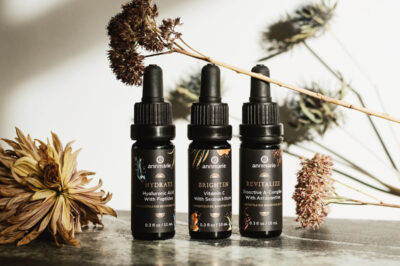Table of Contents[Hide][Show]
Vitamin C is an incredible ingredient to incorporate into your skin care routine. But you may be wondering if it works for all skin types, especially sensitive skin. Sensitive skin types are more susceptible to reacting to triggers in the environment (including weather, pollution, environmental stressors), to allergies, foreign ingredients and chemically-laden products.
If you have sensitive skin, you may have experienced some of the common markers that come with this type:
- redness
- dryness
- a stinging sensation
- feeling itchy or tight
- seeing bumps, scales or hives
- lower tolerance to harsh conditions and chemicals
Sensitive skin can become apparent through constant exposure to harsh chemicals in frequent cosmetic applications. As a result, if you have sensitive skin, you may be more prone to conditions like eczema, contact dermatitis, rosacea and other skin issues.
If you are still uncertain about your skin type, we also have a detailed guide on how to determine your skin type with Annmarie Skin Care product recommendations, so that you can confidently shop for non-toxic skin care best suited for your complexion.
Is Vitamin C Serum Good for Sensitive Skin?
Because sensitive skin types are often more reactive, it can be tricky to know what ingredients are safe for you in your skin care products. Rest assured! Vitamin C can be a skin boosting ingredient in serums that’s great for sensitive skin types, helping to brighten, firm and calm complexions. You just need to be aware of the right derivatives of vitamin C that’s best suited for your sensitive skin. Otherwise, certain forms can actually irritate your skin.
L-ascorbic acid is the most commonly used form of Vitamin C in skin care. Most effective for your skin at a lower pH, l-ascorbic acid works best in skin care products at a lower and more acidic pH of 3.5. The lower pH can irritate more sensitive skin types with sensations of stinging and redness. However, any higher, and the l-ascorbic acid becomes inactive and ineffective for your skin.
Other forms of Vitamin C include magnesium ascorbyl phosphate (MAP) and ascorbyl palmitate. MAP effectively works at a similar pH range as your skin helping to hydrate dry, sensitive and oily skin types. Ascorbyl palmitate is a vitamin C form that isn’t water soluble, but is fat soluble. This makes it more stable and also extends its shelf life. Suited for dry and sensitive skin, ascorbyl palmitate can help provide protection from environmental stressors, but isn’t as effective in helping firm and tone skin.
Our favorite form of vitamin C for sensitive skin is tetrahexyldecyl ascorbate (THDA), an oil-soluble form of vitamin C that’s ideal for all skin types. It absorbs into your skin more deeply than the other vitamin C forms and also is stable at a pH of up to 5, closely matching your skin’s natural pH. Gentle and effective, THDA is fantastic for its anti-aging benefits. Providing your skin all of Vitamin C’s goodness, tetrahexyldecly ascorbate helps to firm, tighten, tone, brighten and protect your skin.
Benefits of Vitamin C Serum for Sensitive Skin

Concentrated Boosting Elixirs Skin Care
Enhance your skin care ritual with Concentrated Boosting Elixirs. Each elixir is extremely active and has been formulated with the highest concentration to allow you to boost your pre-existing regimen with only 1-3 drops. Hydrate, Brighten, and Revitalize your skin with three simple, yet potent elixirs. All three of these elixirs work holistically together to address any specific skin concern.
It’s no wonder that the skin care industry is full of vitamin C touting products. Vitamin C is chock full of powerful antioxidants that help nourish, protect and strengthen your skin’s health. It’s a popular anti-aging ingredient as it helps with everything from protecting against environmental stressors, reducing the appearance of fine lines and wrinkles and fading the look of dark spots.
Here’s more on the benefits of vitamin C serum for sensitive skin. Or, check out this article to learn more about vitamin C benefits for all skin types.
Protects skin against environmental stressors
Everyday when we go out, our skin gets affected by our environment. Stressors such as the sun, pollution, tobacco, dust, pollen, and grime can heavily impact sensitive skin. Applying a vitamin C serum offers a layer of protection for your skin. With its antioxidant properties, vitamin C also works as a preliminary defense and shield for your skin from these stressors. (You can even layer it with niacinamide for the benefits that come from combining the two). We still recommend, however, applying a non-toxic, chemical free sunscreen daily in your skin care routine.
Brightens skin and evens out skin tone
Once introduced to the skin, vitamin C can indirectly inhibit tyrosinase activity (which is responsible for initiating melanin production). Using vitamin C on skin regularly can help fade the appearance of dark spots and even out your skin tone, making for an overall brighter complexion.
Enhances skin firmness and resiliency
As you age, you may find that your skin loses some of its resiliency, and as a result also becomes more sensitive. Topical use of vitamin C is a great way to support the body’s natural process in firming and tightening skin, making for a more bouncy, supple, youthful looking complexion.
Soothes the skin and tackles the look of puffiness
Vitamin C is charged with antioxidants that help soothe your skin by tackling the look of temporary redness and puffiness. Once you get into the routine of using a vitamin C product like a serum, especially one made with high-quality, organic and wildcrafted ingredients, you will start to see the difference—calm, smooth, even skin.
How To Choose The Right Vitamin C Serum
Vitamin C can be amazing for all skin types, but when it comes to sensitive skin, it’s important to first find a product that is formulated with a gentle, but effective vitamin C form. Remember, some forms of Vitamin C aren’t so gentle (even the most common ones on the market), so look for ones that are safe and non-irritating—we recommend tetrahexyldecyl ascorbate. In addition, you’ll also want to steer clear of products with any toxic ingredients and harsh chemicals.
How To Use Vitamin C Serum for Sensitive Skin Effectively for Best Results

Our Brighten Concentrated Boosting Elixir features the safe, oil-soluble vitamin C derivative THDA, which has a pH of up to 5 (close to the skin’s natural pH), making it less irritating for skin and a wonderful vitamin C option for those with sensitive skin. It’s a concentrated and activated product, so all you need is 1-3 drops. The best part? You can add it to your favorite serum or facial oil, making it an easy way to incorporate a high-quality form of vitamin C into your pre-existing skin care routine.
You can apply this product morning and/or night, but if you are using it alongside your retinol-alternative (like our Revitalize Concentrated Boosting Elixir) or an AHA (like our Resurfacing Facial Exfoliant), use Brighten in the morning and Revitalize or Resurfacing Facial Exfoliant in the evening.
- Step 1: Apply 1-3 drops into the palm of your hand with 2-3 pumps of your preferred facial serum or 1-2 pumps of your preferred facial oil.
- Step 2: Blend these combined products well in the palm of hand.
- Step 3: Dab a bit on nose, chin, cheeks and forehead.
- Step 4: Apply to skin with gentle upward strokes.
Please Note: This is a concentrated elixir and should never be applied on its own directly to skin.
Frequently Ask Questions
How often should sensitive skin use vitamin C serum?
When it comes to sensitive skin types, with any product, you’ll want to introduce it slowly to not overwhelm the skin. Before your initial full application, we recommend first doing a patch test.
If there are no issues with the patch test, do a full facial application and start off with using your vitamin C serum or product once a day for a few days to determine if your vitamin C serum or product works harmoniously with your skin. You can work your way up to using it twice daily, morning and evening, if you are not using other nighttime specific products, such as a retinol-alternative or a chemical exfoliant.
With a non-toxic, high-quality vitamin C serum, you’ll typically be able to apply it twice everyday (if not using other nighttime specific products) without a problem, once in the morning and once in the evening, after cleansing and toning your skin.
Can vitamin C serum cause irritation?
Any skin care product has the potential to irritate the skin, including vitamin C. We always recommend doing a patch test when using a new product, especially for those with sensitive skin types.
Look for gentle forms of vitamin C, like oil-soluble tetrahexydecyl ascorbate (THDA), which can be a great option for sensitive skin. One of the key takeaways from learning how to use Vitamin C serum for sensitive skin effectively is to avoid Avoid forms of vitamin C that require a low pH to remain stable in its formulation, as these acidic types can irritate sensitive skin.
What to avoid with vitamin C serum?
When incorporating a vitamin C serum, avoid including too many other activated products in the same skin care session. Be mindful of what products you are pairing your vitamin C serum with and how you are combining them.
For example, if you are using BHAs or AHAs with vitamin C, you’ll want to use your acids in the evening when your skin is not exposed to the sun and apply your vitamin C serum the next morning, followed by a facial oil and sun protection. Similarly, if pairing a vitamin C serum with a retinol-like product, you’ll want to use your retinol-alternative in the evening and your vitamin C serum the following morning.
Mixing them altogether in the same session can overwhelm your skin, negating any of the benefits these products can do on their own. Pair your products carefully in your skin care regimen for best results!








Leave a Reply